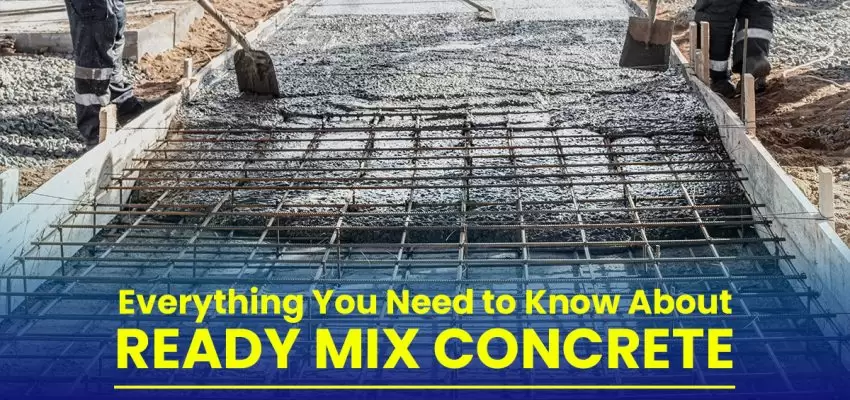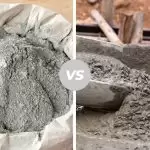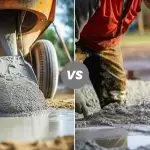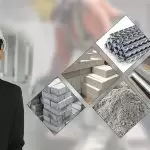Ready-mix concrete (RMC) has become the cornerstone of modern construction, offering a convenient and efficient solution for projects of various scales. In this comprehensive guide, we will explore the different types of ready-mix concrete, understand its significance in construction, and provide essential tips for purchasing the right mix.
Post your Requirement
What Is Ready-Mix Concrete(RMC)?
RMC, or Ready-Mix Concrete, is a construction term denoting concrete that is pre-manufactured in a batching plant or factory and transported to the construction site in a ready-to-use state. This contrasts with the conventional on-site concrete mixing process, where raw materials like cement, aggregates, water, and additives are individually transported and mixed at the construction location. This efficient and time-saving approach, explained to me by our builders during the construction of our first floor, streamlines the concrete delivery process, ensuring a consistent and quality product for construction projects.
Applications Of Ready-Mix Concrete (RMC) in Construction Projects
Ready-mix concrete, commonly known as RMC, is a tailor-made solution for construction projects, offering a pre-mixed, quality-controlled product that proves advantageous in various scenarios. Comprising cement, water, and aggregates, including sand, gravel, or crushed stone, RMC ensures a consistent and reliable mix. The construction material has gained immense popularity with its uniform consistency, superior quality, and efficiency in different applications. Below are some key applications of RMC in construction projects:
Residential Construction
Ready-mix concrete is widely used in the construction of different kinds of residential structures, such as foundations, slabs, and other structures in homes, societies, and other surrounding structures to ensure their longevity and stability in the long run.
- It is used in the construction of foundations, slabs, columns, and beams in houses and apartment buildings.
- With enhanced construction speed and uniform quality, RMC proves to be a reliable material for building sturdy structures.
Commercial and Industrial Projects
The high-quality building materials of RMC also help to enhance the efficiency of large-scale construction projects with its uniform quality, stringent testing, and reliable consistency. Therefore, RMC is also a major part of the construction of different commercial and industrial projects such as offices, corporate buildings, shopping complexes, retail stores, warehouses, factories, and other structures. Depending on the laid bearing capacity and the customization options of different types of RMC, it can be used for different applications.
- RMC proves to be an ideal choice for high-rise office buildings, shopping malls, and industrial complexes.
- The material imparts structural strength to different structures with superior durability and faster completion timelines.
Infrastructure Development
The strength and durability of the building material RMC has made it a great choice for the building of large-scale and complex infrastructural structures that witness heavy loads and constant environmental stress. The high-quality RMC ensures long-term performance in these projects with high stability and effectiveness even in harsh conditions.
- Roads and Highways: RMC is widely used in the construction of rigid pavements such as highways, expressways, and flyovers.
- Bridges and Tunnels: The material ensures high compressive strength and durability under extreme conditions, thus making it a great material for bridges and tunnels.
- Railway Projects: It is also a suitable material for the building of railway platforms, track beds, and bridges demanding superior strength and stability.
Water Retaining Structures and Marine Construction
RMC is designed to offer effective water-resistant properties and stability even under high water pressure, thereby making it a perfect building material for the construction of structures with consistent exposure to water. Ranging from dams and reservoirs to ports and seawalls, RMC ensures the building of durable structures that stand the test of time.
- RMC is an important material for the construction of dams, reservoirs, and canals due to its water-resistant properties.
- The material is extensively used in the development of ports, harbours, docks, and seawalls where exposure to saltwater requires durable concrete.
- The material ensures structural stability and longevity under high water pressure for dams and other relevant structures and, with effective resistance to corrosion and environmental degradation, proves to be a reliable choice even for coastal applications.
Decorative Concrete
RMC is primarily known for its structural applications, but it is also an incredible choice for different decorative purposes. The material can be easily coloured, stamped, and even textured for the creation of aesthetically pleasing surfaces for flooring purposes, countertops, sidewalks, and other applications.
- The material is a versatile choice with its ability to be used in stamped, stained, and polished concrete finishes for a tempting visual appeal in interior and exterior applications.
- It also provides some creative architectural solutions for the construction of sidewalks, patios, driveways, and commercial flooring for enhanced visual appeal.
Repair and Maintenance
The material of RMC is also an incredible choice for numerous repair and maintenance projects. The material comes with quick-setting times and is also an easy-to-use material ideal for patching cracks, resurfacing pavements, and reinforcing existing structures.
- The material is actively used for structural repairs, patching damaged concrete, and resurfacing old structures.
- RMC guarantees long-term durability in structures and even restores structural integrity in ageing infrastructure.
Mass Concrete Projects
RMC, with its superior strength and sturdiness, along with uniform quality and consistency, serves an integral role in the construction of mass projects requiring precision and faster construction along with large-scale work. It is also used in the building of precast structures that are widely used in mass projects.
- RMC is applied in large-scale construction projects such as stadiums, metro projects, and airports.
- The material proves to be an essential component of the manufacturing process of precast elements like concrete blocks, beams, pipes, and wall panels.
- RMC reduces material wastage and enhances efficiency in large-volume pours while speeding up the construction process.
Types Of Ready-Mix Concrete
The material of ready mix concrete is primarily of three types: Shrink concrete mix, Central mix concrete, and transit mix concrete based on the specific mixtures of ingredients. You need to have a brief understanding of the different types, their specific features, and applications of the different types to make an informed decision for your project.
- Shrink Mixed Concrete
- Transit Mixed Concrete
- Central Mixed Concrete
1. Shrink Mixed Concrete
This is a kind of RMC that is partially mixed in the original batching plant and then transported to the transit mixer for further mixing. The balance mixing is completed in the mountain drum of the truck either during transit or at the worksite. This type of process ensures reduced load on the plant while ensuring adequate mixing before use. The amount of RMC that will be mixed in transit is determined by the amount that was mixed in the plant. This type of method is particularly ideal for large-scale construction projects where uniform consistency and large amounts of RMC are required.
2. Central Mixed Concrete
The original plant where the RMC is properly mixed before it is transported with a truck mixer is called the central batching plant. Therefore, as the name suggests, the central mixed concrete refers to a kind of RMC where the materials are thoroughly mixed before they are loaded in the truck and transported. During transportation, the mixing drum of the truck serves to be an agitator further ensuring the consistency and workability of the material. This type of RMC is manufactured under controlled conditions further ensuring the quality and reliability of the whole product.
3. Transit Mixed Concrete
Also known as the truck mixed concrete or dry-batched concrete, this is a type of RMC where all the essential components including the water, cement, and admixtures are loaded into the truck mixer and the mixer drum of the truck rotates at the charging speed while the RMC is being loaded and continues to do so at a regular agitation pace for proper mixing during transportation. This ensures superior consistency in the final material and reduces the overall risks of segregation in the RMC. This method leads to the creation of three varieties of RMC which include the following:
- Mixed at the Job Site: This is a type of process where the mixer drum is rotated at a slow agitating speed of 2 rotations per minute while the material is transported. When the material arrives at the location, the material is first rotated for roughly 70 to 100 revolutions at a maximum speed of 12 to 15 rpm and then the material is removed from the mixer. This ensures the smooth and uniform mixing of the material and ready-to-use benefits.
- Mixed in Transit: This is the type of method where the drum mixer is used at a medium speed throughout the transportation process. The drum mixer rotates continually at an approximate speed of 8 rpm for roughly 70 revolutions. Then once this is completed, the drum mixer speed is slowed down to an agitation speed of 2 rpm before the material is removed from the drum.
- Mixed in the Yard: This is a type of transit mixer RMC where the material is mixed in the yard. The mixer drum is rotated at a high speed of 12 to 15 rpm for approximately 50 revolutions, and then the RMC is agitated slowly when the material is in transit.
Importance Of Ready-Mix Concrete
Manufactured in meticulously controlled environments, our products epitomize consistent quality and strict adherence to industry standards. The precision achieved in these controlled settings ensures that each unit meets the highest benchmarks, guaranteeing reliability and durability in construction projects. This commitment to quality translates into enhanced structural integrity and longevity.
Emphasizing time efficiency, our products are ready for immediate use upon arrival at the construction site. This eliminates the need for on-site mixing, reducing labour hours and expediting the construction timeline. This time-saving advantage not only enhances project efficiency but also contributes to overall cost-effectiveness.
Environmental consciousness is at the core of our manufacturing processes. By employing precise measurements, we minimize material wastage, resulting in cost savings and promoting environmental sustainability. Our plants are strategically designed to incorporate sustainable practices, such as water recycling and energy reduction, thereby reducing the overall environmental impact of our operations. We are dedicated to providing solutions that not only meet construction needs but also prioritize the responsible use of resources, aligning with global efforts toward a greener and more sustainable future.
Tips For Purchasing Ready-Mix Concrete
Initiating a successful concrete project involves a meticulous process that begins with consulting a structural engineer to determine the required strength. This professional assessment is essential for ensuring that the concrete can withstand the anticipated loads and environmental conditions specific to your project.
Following this, it is imperative to calculate the exact quantity of concrete needed. Precise measurements help avoid unnecessary wastage, promoting cost efficiency while minimizing environmental impact. Accurate calculations also contribute to the overall sustainability of the project.
Choosing the right mix is another critical step. Consider the unique properties required for your project, such as strength, durability, and workability. Tailoring the concrete mix to these specifications ensures optimal performance and longevity of the structure.
Equally important is the selection of a reputable supplier. Prioritize suppliers with a proven track record of delivering high-quality concrete consistently. Checking the supplier’s reputation helps mitigate risks associated with substandard materials, ensuring the reliability and safety of your construction project.
Lastly, check the supplier’s delivery schedule to ensure alignment with your project timeline. Timely delivery is crucial for preventing construction delays, enabling a seamless workflow, and meeting project deadlines. By following these steps, you lay a solid foundation for a successful and efficient concrete project.
Conclusion
Ready-mix concrete (RMC) stands as a testament to innovation in the construction industry, offering consistency, time efficiency, and environmental sustainability. When acquiring RMC, meticulous consideration of strength, quantity, mix type, supplier reputation, and delivery schedule is crucial. By prioritizing these factors, construction professionals can ensure the success of their projects while contributing to a sustainable and efficient construction ecosystem.
Read Also: RMC vs. Self-Mixed Concrete: Choosing the Right Option For Your Project
FAQ’s
Q-1. What precautions should be taken when handling ready-mix concrete?
A-1. Handling precautions include using protective gear, avoiding direct skin or eye contact, adhering to manufacturer instructions for mixing, storing in a cool place, using the concrete within its shelf life, and proper disposal according to local regulations.
Q-2. What is ready-mix concrete, and how is it produced?
A-2. Ready-mix concrete is a pre-made blend of cement, water, and aggregates. It is produced in a controlled environment in a batching plant. The mixture is transported to the construction site in a concrete mixer truck, ensuring consistent quality.
Q-3. What are the different types of ready-mix concrete available?
A-3. Various types of ready-mix concrete include standard, high-strength, self-compacting, lightweight, and fiber-reinforced. Each type is tailored to meet specific construction project requirements, offering versatility and adaptability.
Q-4. How is ready-mix concrete delivered to construction sites, and what is its shelf life?
A-4. Ready-mix concrete is transported in mixer trucks equipped with rotating drums. The shelf life ranges from 90 minutes to two hours, depending on factors like cement type, ambient temperature, and storage conditions.
Q-5. What advantages does ready-mix concrete offer in construction projects?
A-5. Ready-mix concrete provides consistency, time savings, and cost-effectiveness. It reduces labor costs, minimizes wastage, and is known for its durability and strength, making it suitable for various construction applications.























Post A Comment